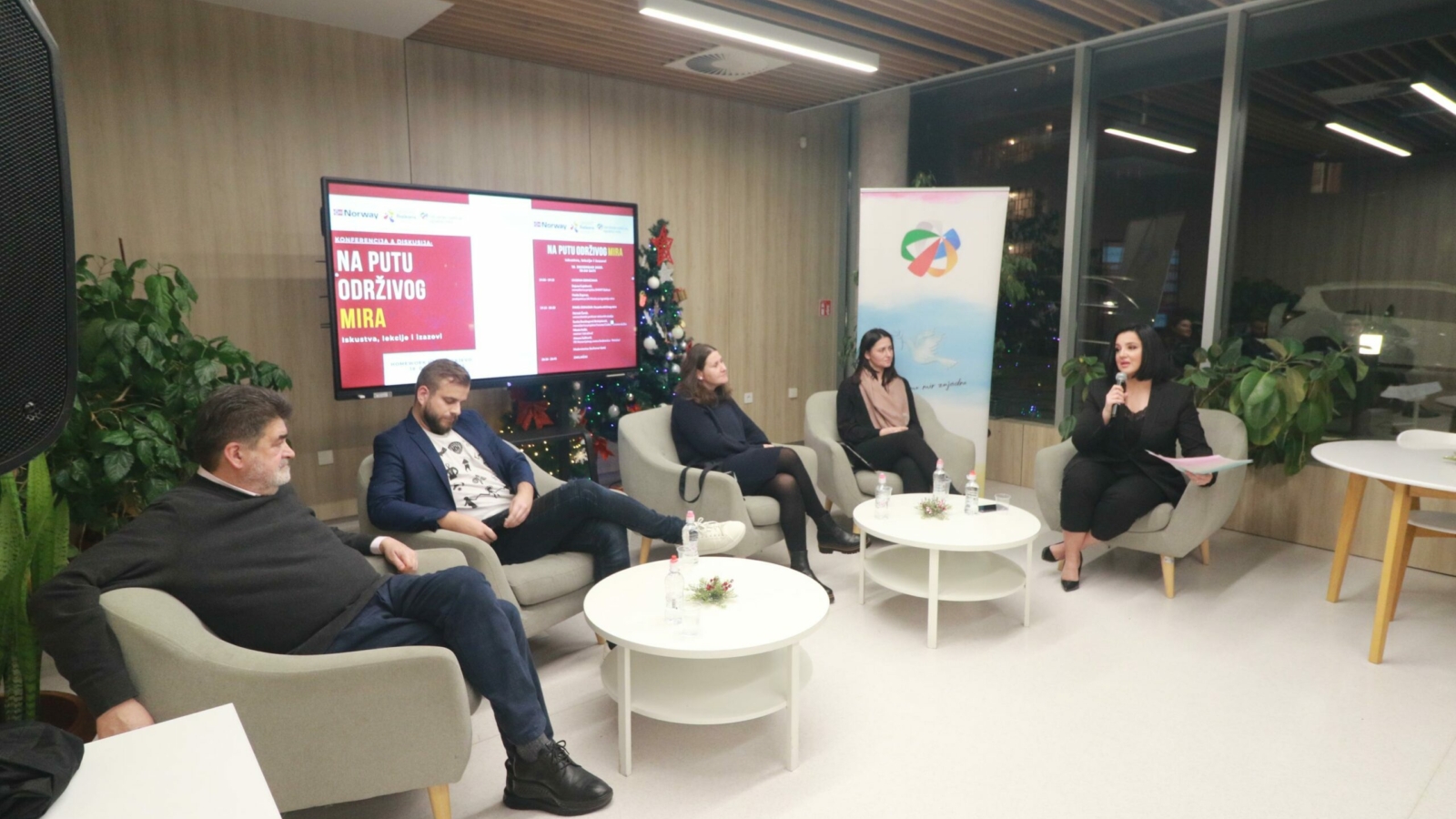Conference and panel discussion „On the Path to Sustainable Peace – Experiences, Lessons, and Challenges“ organized by the Association Network for Building Peace, took place on Monday, December 18 in Sarajevo with the support of the regional project SMART Balkan, implemented by the Centar za promociju civilnog društva (CPCD) Bosnia and Herzegovina, along with partner organizations Center for Research and Policy Making (CRPM) North Macedonia and Institute for Democracy and Mediation (IDM) Albania, financially supported by the Norwegian Ministry of Foreign Affairs.
Nerzuk Ćurak, a professor of peace studies, stated that negative peace, a state characterized only by the absence of violence, is not a solution for Bosnian-Herzegovinian society.
„I encourage everyone to continue debating on how to advance peace in Bosnia and Herzegovina, how to move beyond negative peace, which merely signifies the absence of violence, and to build a good peaceful society that includes freedom and justice. This is not possible without such discussions becoming a part of our everyday life, taking the public square away from violence and nationalists. It’s not easy without significant support, and this is my appeal for the Association Network for Building Peace and others not to give up on seeking allies to build a good, inclusive, positive and peaceful society in Bosnia and Herzegovina“, said Ćurak.
Nikola Vučić, a journalist and researcher, reminded that building positive and sustainable peace is only possible through the collaboration of all groups with a positive attitude towards Bosnia and Herzegovina.
„On the path to a sustainable peace, there are obviously different factors trying to maintain the status quo in Bosnia and Herzegovina and, through the status quo and negative peace , seek benefits, primarily political, institutional and material. During the conference, we established that, despite all these elements hindering sustainable peace, groups with a positive attitude towards Bosnia and Herzegovina and its future can collaborate together to minimize the voices of destructive factors. So, strategy is clear: work on the ground and actively advocate for peace discussions to make a peace alive in every corner of Bosnia and Herzegovina“, said Vučić.
Sunita Dautbegović Bošnjaković, the project manager of the Civil Peace Service Forum, stated that there is a peacebuilding capital, which is the merit of the entire civil society. This capital, according to Dautbegović Bošnjaković, needs to be translated into official state policies.
„Peace events are generally very important for Bosnia and Herzegovina to continually emphasize that peace may need to be the most crucial national issue. It is also important for the peace community to reflect, to hear each other, and to have that common space. 28 years laters, we can say that civil society, including the media, the academic community, and activists, has created a capital in the context of peacebuilding. If they had not been doing that, it is questionable what our country would look like today. We have many examples of positive practices that I believe we can apply in peacebuilding and be proud that in this peacebuilding process, we have built such an important community of activists and achieved results. However, what we need to insist on even more is that these do not remain alternative results, alternative narratives, but that they find their way into institutions, into the state which ultimately have a responsibility for peace, and that they integrate them into official peacebuilding policies“, pointed out Dautbegović Bošnjaković.
Almasa Salihović, PR of the Srebrenica-Potočari Memorial Center, noted that education is key to building sustainable peace.
„Tonight the focus was mostly on the genocide in Srebrenica and I spoke about the role of the Srebrenica Memorial Center in sustainable peace and how to achieve it. Perhaps, at the level of Bosnia and Herzegovina, the Memorial Center cannot do much for sustainable peace, but what we can work on is education. I believe that events like this can educate people, and it is crucial to speak the right words. Everyone stands with this message: we can and must all come together for sustainable peace, and that is the only path we must take in our country“, said Salihović.
Confronting the past and building peace in the Western Balkans, especially in Bosnia and Herzegovina, remains a challenge for both governmental and non-governmental organizations, as well as for peace researches and activists. Various modalities have been applied over the past three decades to bring the „experience of peace“ to areas that were devastated by war in the 1990s. Today, 28 years after the signing of the Dayton Peace Agreement, there is a need to strengthen the capacities of civil society organisations to provide a relevant and contextually appropriate response to the challenges of facing the past and building peace, grounded in practical solutions. Despite certain positive indicators, i tis evident that political stability in Bosnia and Herzegovina is often linked to issues related to the past, and all of this also affects the security of citizens.




















